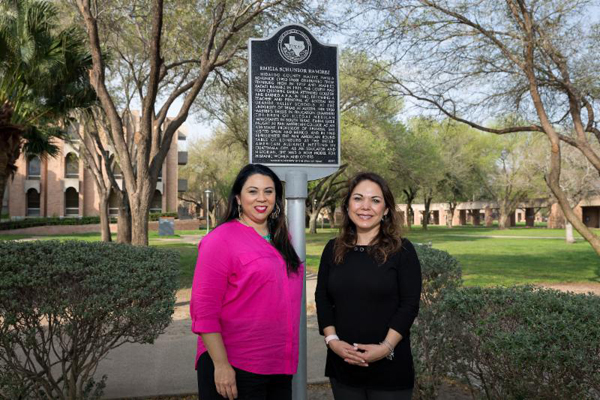Don't Miss
- La Feria Community Holds Succesful Business Mixer Event
- Little Nashville to Take Place in Downtown Mercedes
- Lions Basketball Captures District Gold
- La Feria ISD Students Compete in Regional Chess Tournament
- Lions End First Half of 32-4A on a High Note
- La Feria ISD Held Another Successful Parent Conference
- Strong Appearance for Lions at Hidalgo Power Meet
- LFECHS Students Get to Meet Local Actress
- Students Participate in Marine Biology Camp
- Two LFECHS Students Qualify for All-State Band
UTRGV Project Commits to Helping Valley Elementary School Teachers Expand on Local History
- Updated: February 22, 2019

Dr. Stephanie Alvarez (at left), UTRGV associate professor for Mexican American Studies and director of the Center for Mexican American Studies, and Dr. Joy Esquierdo, UTRGV professor for Bilingual and Literacy Studies and director of the Center for Bilingual Studies, have received a two-year grant for their ‘Social Studies through Authentic and Relevant Content’ (SSTARC) program, which will help equip educators to teach regional history. They are shown here at the Emilia Schunior Ramirez Texas Historical Marker on the UTRGV Edinburg Campus. UTRGV Photo
by Amanda L. Alaniz
EDINBURG, TEXAS – Two University of Texas Rio Grande Valley professors have received a grant from the National Endowment for the Humanities for a project focused on how to implement Rio Grande Valley history into elementary classrooms.
The NEH grant, awarded to Dr. J. Joy Esquierdo, director of the UTRGV Center for Bilingual Studies and professor for Bilingual and Literacy Studies, and Dr. Stephanie Alvarez, director of the UTRGV Center for Mexican American Studies and associate professor for Mexican American Studies, for their project, “Social Studies through Authentic and Relevant Content: Promoting Humanities Learning in Elementary Schools.”
The project aims to provide opportunity and resources for kindergarten through fifth-grade teachers to form appropriate grade-level curricula that implement local and regional history, creating culturally relevant social studies content for students in both English and Spanish.
Project “SSTARC” was granted $99,991 for the two-year collaboration between the Center for Bilingual Studies, Center for Mexican American Studies and two local school districts – Pharr-San Juan-Alamo Independent School District and Harlingen Consolidated Independent School District.
Esquierdo said this as an opportunity for students to gain insight into where they come from, and opens doors for teachers to be creative with social studies lessons.
“The project is about helping students, educating them with the information they would not typically find in a textbook,” she said. “It will help them better understand their background and their community. Parents, hopefully, will learn from this when kids go home with this new information.”
Esquierdo and Alvarez currently are working with the two school districts to determine which teachers will be participating in SSTARC. The teachers selected will take part in two different four-day workshops. The first set of workshops are scheduled to take place this summer.
They explained that the workshops will have four scholars from UTRGV Mexican American Studies, giving presentations and presenting material to help develop content for the curricula.
“We will work with the scholars and teachers to create a curriculum that’ll connect the Mexican American Studies curriculum into their dual language pedagogy and the Texas Essential Knowledge and Skills (TEKS),” Alvarez said. “You’ll have all of it combined, offering the best of those worlds to Valley students.”
Once the teachers create the units, they will select one they would like to try in their classrooms and begin using it the following school year.
Participating teachers will return in summer 2020 to refine the units, make any necessary changes and add supplemental material.
In late fall 2020, UTRGV will offer a one-day conference open to RGV elementary school teachers, where the participating SSTARC teachers will present the newly designed social studies curriculums.
“The attending teachers will get a glimpse of what the curriculum is about,” Esquierdo said. “The presenting teachers will showcase their outcomes of the unit, and will share their own experiences and how students and families responded.”
The ultimate goal of the project is to bring a unique and culturally relevant spin to the social studies being taught in elementary schools.
Alvarez said bringing that type of curriculum to children is an asset.
“We know that students who take ethnic courses have higher graduation rates, and higher achievement rates,” she said. “We’re really happy to be able to have this opportunity, especially for K-5th graders, because students usually don’t have access to this until college or high school.”
Once the project is complete and the units are reviewed and tweaked, Alvarez and Esquierdo plan to make them available online, where any teacher can have access to the material.
“We’re preparing teachers to teach Latino students – which means a different type of teaching,” Alvarez said. “We need to have culturally responsive, culturally relevant and culturally affirming curriculums. And this project is what that does.
“We need the little kids, middle school kids and high school kids to see themselves reflected in the curriculum, and that is Hispanic Serving,” she said.


